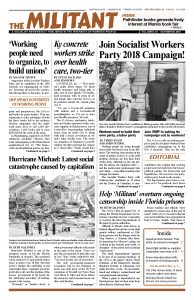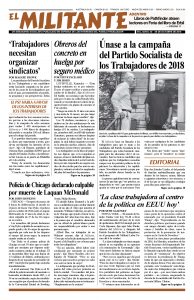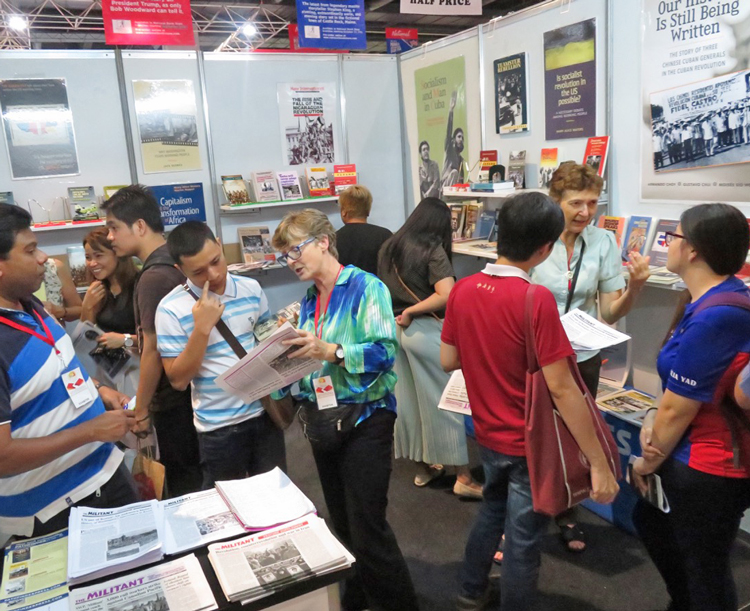MANILA, Philippines — There was hardly an hour when the Pathfinder booth at the Sept. 12-16 Manila International Book Fair wasn’t packed with fairgoers of all ages browsing the shelves with growing enthusiasm for the books they saw. The crowds kept coming even after a powerful storm sideswiped the city Sept. 15. The center of the deadly typhoon hit further north, killing over 100 and leaving a social catastrophe for tens of thousands.
By the end of the fair the next day, the shelves had been stripped almost bare. During the five-day event and days after, more than 700 books were bought, many by young people who often spent quite a while at the stand perusing the 150 different titles available while consulting and deciding which they most wanted to read. In addition, some 25 people subscribed to the Militant.
This was the first time in nearly 30 years that New York-based Pathfinder Press participated in this fair. Its books on working-class history and politics, written by revolutionary leaders of those struggles, have never been widely available in this country, despite the common usage of English. The eager response was a measure of how the sharpening social and political crises of capitalism is pushing working people worldwide, including youth, to learn more about their own history as part of the search for a way forward.
Volunteer workers staffing the booth came from Communist Leagues in Australia, Canada and New Zealand, and the Socialist Workers Party in the United States. Two young Filipinos active in social and political struggles here helped staff the booth, bringing friends to join the nonstop political discussions.
These discussions took up the important international shifts occurring as the post-World War II imperialist world order comes apart under the weight of its own contradictions and unavoidable crises; the importance for working people of denuclearizing the Korean Peninsula; the sharpening rivalry between Washington and Beijing in Asia, the Pacific, and beyond; and the devastating wars in the Middle East. A recurring question was what the vote for Donald Trump says about the working class in the United States.
The volunteers explained how the perspectives contained in the books draw on the lessons from nearly two centuries of working-class struggles. These help chart a course to effectively resist the assaults by the ruling rich and build a movement of the working class and its allies capable of taking state power out of the hands of the capitalist rulers. Many were attracted to books by leaders of the Cuban Revolution explaining how working people in Cuba accomplished this historic task — information rarely available in the Philippines.
Rich political discussions
Renate Canetere and his Peruvian friend Christian Bernal told two of the volunteers at the stand, Baskaran Appu from New Zealand and Ron Poulsen from Australia, that in their opinion, “Communism is a far-off utopia based on a rigid ideal of equality.” Appu and Poulsen explained that such a conception of communism reflected the rationalizations and practice of Maoism, the variant of Stalinism long dominant in the Philippines. This has repulsed many working people, driving them away from revolutionary politics. “It is the counterfeit of Marxism,” they explained.
“Just look at the revolution in Cuba in which millions of workers and peasants transformed themselves in the struggle against the Batista dictatorship. Led by genuine communists like Fidel Castro and Che Guevara they won political power, carried out a socialist revolution on Washington’s doorstep and have defended it for 60 years,” Poulsen said.
“That’s a better model,” Canetere agreed.
Call center worker Rhys Valdez asked Katy LeRougetel from Canada, “Did you know that the owner of the SM Mall of Asia [where the book fair was held] is the richest man in the Philippines? He also owns the call centers that occupy the many tall office buildings around here. A cashier in this mall earns half what I do.”
The Philippines is today the call center capital of the world, with well over a million English-speaking Filipino workers serving U.S., Australian and other companies. These jobs, which account for 10 percent of the gross domestic product of the Philippines, are the best-paying work many young people can get, especially with overtime. Various political forces here are seeking to organize unions among the workers at some centers.
An estimated 2.3 million Filipinos, both men and women, are overseas as contract workers, with over half in the Middle East working in Saudi Arabia, the Gulf States, Israel and Jordan, so the conflicts and wars in that region have a direct impact here. Titles dealing with anti-Semitism and the fight against Jew-hatred sold out quickly, including Leon Trotsky’s On the Jewish Question.
Many booth visitors read with interest the statement of the SWP titled “For Recognition of a Palestinian State and of Israel,” which puts forth a course of struggle by all working people in the region — Arab, Israeli, Persian, and many others — to organize and act together in their own class interests, overcoming the divisions imposed by their capitalist exploiters.
Titles related to the fight against women’s oppression attracted constant interest and discussion and were among the best-sellers at the fair. The pamphlet Abortion Is a Woman’s Right! by Pat Grogan was especially sought after. Abortion is illegal under all circumstances in the Philippines, and it is a question that is hotly debated.
Graduate student Angela Villanueva was one of those who strongly supported a woman’s right to choose. “Abortion should be legalized,” she told New Zealand volunteer Janet Roth. “Whatever the reason, it is a woman’s choice to make that decision.” Answering one of the arguments often made by opponents of women’s rights, she said, “Legalization will not mean women will just go and get pregnant. Abortion is not always an easy choice.”
The Philippines is also one of only two states in the world — the Vatican being the other — where there is no legal possibility of divorce.
Interest on Philippine campuses
The team of Pathfinder volunteers also set up book tables at the Polytechnic University of the Philippines and at the University of the Philippines to reach students unable to spend long hours in brutal Manila traffic getting to and from the fair. The same avid response was evident on both campuses. During the fair Pathfinder volunteers were invited to bring their books and speakers to other campuses on future visits.
Danica Canon, an 18-year-old student at the University of the Philippines, told Rachel Wilson from the Socialist Workers Party about demonstrations scheduled for Sept. 21 calling for the ouster of Philippine President Rodrigo Duterte. This marked the 46th anniversary of former President Ferdinand Marcos’ imposition of martial law in 1972, a dictatorship that lasted until it was overthrown by popular mobilizations in 1986. “The students are organizing to unite the people’s struggles against the current president, who is a fascist,” she said.
“In the U.S., sometimes people say President Donald Trump is a fascist,” Wilson replied. “But he’s not. If Trump were leading a fascist movement, we wouldn’t be able to have meetings and protests like you are organizing. Thugs would be trying to bust up union meetings, social protests and book fairs. It is the world capitalist crisis that is propelling the assaults on our wages, working conditions and democratic rights. And they will provoke more working-class struggles. We need to use the space that is open to us and defend it.”
Cosmetics, Fashions and the Exploitation of Women, by Joseph Hansen, Evelyn Reed and Mary-Alice Waters, was featured at a book presentation during the fair and at another meeting at the University of the Philippines. (A coming issue of the Militantwill report on those presentations.) The book topped sales at the fair with 41 copies purchased. It was followed closely by Are They Rich Because They’re Smart? by SWP National Secretary Jack Barnes, with 29 sold. That title would easily have been the top seller if supplies had not run out long before the end.
Kevin Ansel Dy, from Ateneo University Press, was one of those who came by the booth several times, interested in getting more Pathfinder titles into the campus library. Spotting Are They Rich Because They’re Smart? he laughed appreciatively, telling Roth a story about Imelda Marcos, the wife of the longtime dictator. “When Imelda Marcos was asked by a reporter ‘Why are all your friends and relatives getting so fabulously rich under your husband’s regime?’ her reply was ‘Honey, some people are just smarter than others.’”
Other top sellers at the fair included Feminism and the Marxist Movement by Mary-Alice Waters; Problems of Women’s Liberation by Evelyn Reed; Our History Is Still Being Written: The Story of Three Chinese-Cuban Generals in the Cuban Revolution by Armando Choy, Gustavo Chui and Moisés Sío Wong; Malcolm X, Black Liberation, and the Road to Workers Power by Jack Barnes; Fascism: What It Is and How to Fight It by Leon Trotsky; and Is Socialist Revolution in the US Possible? by Mary-Alice Waters. All the copies of The Communist Manifesto by Karl Marx and Frederick Engels sold out rapidly.


